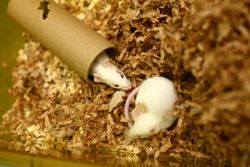Knockout mice & gene targeting
The Nobel Prize in Physiology or Medicine 2007 was awarded jointly to Mario R. Capecchi, Sir Martin J. Evans and Oliver Smithies "for their discoveries of principles for introducing specific gene modifications in mice by the use of embryonic stem cells".
US Scientists Mario Capecchi and Oliver Smithies were both working on ways to alter specific sequences on the mammalian genome. They realised independently that a technique used to mutate bacteria through exposing them to x-rays could also introduce mutations into mammalian genes. Meanwhile, Martin Evans was working on embryonic stem-cells in the UK. He developed a way to alter the stem-cells, and then inject them into a fertilized mouse egg cell.

Combining their research brought about ‘gene targeting’. A mutant mouse gene was created in a bacterial plasmid, using Capecchi and Smithies’ techniques. They replaced a specific gene with a similar genetic sequence, which was modified to contain a mutation. The plasmid was injected into mouse embryonic stem cells, which were injected into a host embryo. The host embryo was allowed to grow normally, incorporating the mutation into its genetic code.
The offspring of the host mouse carried the mutant gene, and the offspring of two mutants expressed the mutant gene. The mutant gene could not function, and so was ‘knocked out’. This showed how a mouse with a non-functioning copy of the gene differed from normal mice.
Many (more than half) mouse genes have now been knocked out, and there are efforts to make knockout mice for all genes. The short-life span of the mouse was crucial to the development of this technique. While mutant strains have been bred for many years, gene targeting allows specific physiological features to be studied.
Further reading
http://www.nobelprize.org/nobel_prizes/medicine/laureates/2007/popular-medicineprize2007.pdf
http://www.nature.com/news/2007/071009/full/449642a.html
http://www.nytimes.com/2007/10/09/science/09nobel.html
http://www.telegraph.co.uk/science/science-news/3309833/Sir-Martin-Evans-on-his-astonishing-Nobel-prize.html
Last edited: 11 November 2014 15:23
